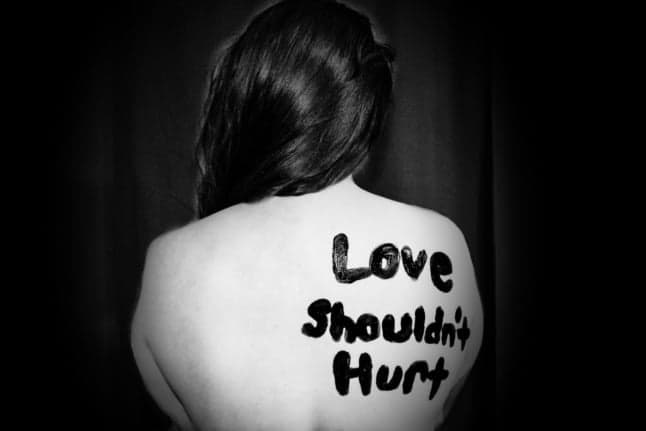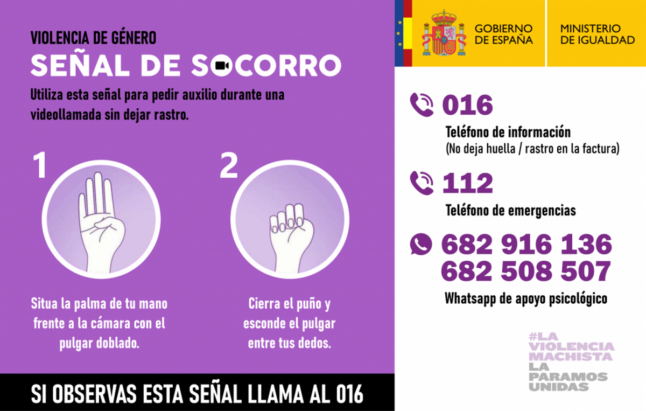What to do if you're in an abusive relationship in Spain

Aside from physical violence, emotional abuse, intimidation, stalking and deprivation of freedom are also forms of violence. What steps can you take if you're in an abusive relationship in Spain?
Men's violence against women is one of the biggest crime and societal problems in Spain. But combating it isn't easy, not least because it often happens behind closed doors.
According to the Spanish government, 38 women have been murdered in 2022, adding to a total of 1,171 since 2003.
And they're not the only victims as 26 minors have become orphans as a result this year, 360 over the past decade. A survey by Spain's Ministry of Equality estimates that 1.7 million children in Spain witness gender violence at home. Forty-eight children have also been murdered in the last ten years by their mothers' partners or ex-partners.
November 25th marks the International Day for the Elimination of Violence Against Women, a day which usually sees thousands of protesters march through the streets of Madrid, Barcelona and other cities in Spain demanding "urgent and firm action" to combat men's violence against women.
A staggering 78 percent of women over the age of 16 who have been victims of physical violence don't report it to the police.
If you've been a victim of gender violence, here are the steps you can take.
What should I do if I'm in an emergency?
Firstly, if you are in an emergency situation you can contact the police and emergency services at the following numbers:
Emergency services: 112
Policía Nacional (National Police Corps): 091
Guardia Civil (Civil Guard): 062
Where can I seek help and advice?
If you are not sure what kind of help you need, the first thing to do if you are in an abusive relationship is call the free confidential helpline 016, a public service available 24/7 where you can speak to professionals with guaranteed confidentiality in 53 different languages. You can also email [email protected] or WhatsApp 600 000 016.
The service is provided by the government's committee against gender violence (Delegación del Gobierno contra la Violencia de Género), which has a dedicated website with information and resources.
You can also get free legal advice and information by calling 061.
If you are a minor and you think family member may be a victim of gender violence you can call ANAR (Ayuda a niños y adolescentes en riesgo), on 900 20 20 10.
The Equality Ministry's WRAP website (web de recursos de apoyo y prevención ante casos de violencia de género), has a search tool for finding all the NGOs, women's associations, police stations and courts closest to you.
For a guide of your rights as a victim of gender violence in Spain, the Ministry also provides a document in several languages including English, HERE.
'Only yes means yes': Spain moves to tighten consent laws against rape
What happens when I report someone to the police?
Making a formal complaint (denuncia) for gender violence is considered a significant threat to safety and should therefore result in the immediate detention of the aggressor.
The detention can last up to 72 hours until a formal judicial deposition is made. After this period, the judge can then either let the accused go or issue a restraining order. Breaking the restraining order will result in a new complaint with more serious legal consequences.
If you live with your aggressor, the restraining order means they will not be able to return to the shared home and will be deprived of the custody of any children you have together. He will not be able to claim joint custody until a criminal trial ruling is issued, which can take several years.
It will also result in the loss of the right to obtain public subsidies, and they will be included in the Central Registry of Abusers.
Can I get financial support?
The Comprehensive Law of Protection Measures against Gender Violence (Ley Integral de Medidas de Protección contra la Violencia de Généro) includes financial support for women who have been victims of gender violence.
Women who are not able to find a job or participate in training courses can have access to financial support provided in the form of a single payment, representing the equivalent of six months of unemployment benefits.
These benefits are currently managed by the different autonomous communities.
How do I ask for help without my abuser knowing?
If you want to call for help without attracting the attention of your abuser, you can make the hand gesture indicated in the photo below on a video call, so the person you a talking to can call for help.
The 016 helpline, as indicated below, doesn't leave a trace on your phone so you can call without worrying about it appearing on your call history.

Comments (1)
See Also
Men's violence against women is one of the biggest crime and societal problems in Spain. But combating it isn't easy, not least because it often happens behind closed doors.
According to the Spanish government, 38 women have been murdered in 2022, adding to a total of 1,171 since 2003.
And they're not the only victims as 26 minors have become orphans as a result this year, 360 over the past decade. A survey by Spain's Ministry of Equality estimates that 1.7 million children in Spain witness gender violence at home. Forty-eight children have also been murdered in the last ten years by their mothers' partners or ex-partners.
November 25th marks the International Day for the Elimination of Violence Against Women, a day which usually sees thousands of protesters march through the streets of Madrid, Barcelona and other cities in Spain demanding "urgent and firm action" to combat men's violence against women.
A staggering 78 percent of women over the age of 16 who have been victims of physical violence don't report it to the police.
If you've been a victim of gender violence, here are the steps you can take.
What should I do if I'm in an emergency?
Firstly, if you are in an emergency situation you can contact the police and emergency services at the following numbers:
Emergency services: 112
Policía Nacional (National Police Corps): 091
Guardia Civil (Civil Guard): 062
Where can I seek help and advice?
If you are not sure what kind of help you need, the first thing to do if you are in an abusive relationship is call the free confidential helpline 016, a public service available 24/7 where you can speak to professionals with guaranteed confidentiality in 53 different languages. You can also email [email protected] or WhatsApp 600 000 016.
The service is provided by the government's committee against gender violence (Delegación del Gobierno contra la Violencia de Género), which has a dedicated website with information and resources.
You can also get free legal advice and information by calling 061.
If you are a minor and you think family member may be a victim of gender violence you can call ANAR (Ayuda a niños y adolescentes en riesgo), on 900 20 20 10.
The Equality Ministry's WRAP website (web de recursos de apoyo y prevención ante casos de violencia de género), has a search tool for finding all the NGOs, women's associations, police stations and courts closest to you.
For a guide of your rights as a victim of gender violence in Spain, the Ministry also provides a document in several languages including English, HERE.
'Only yes means yes': Spain moves to tighten consent laws against rape
What happens when I report someone to the police?
Making a formal complaint (denuncia) for gender violence is considered a significant threat to safety and should therefore result in the immediate detention of the aggressor.
The detention can last up to 72 hours until a formal judicial deposition is made. After this period, the judge can then either let the accused go or issue a restraining order. Breaking the restraining order will result in a new complaint with more serious legal consequences.
If you live with your aggressor, the restraining order means they will not be able to return to the shared home and will be deprived of the custody of any children you have together. He will not be able to claim joint custody until a criminal trial ruling is issued, which can take several years.
It will also result in the loss of the right to obtain public subsidies, and they will be included in the Central Registry of Abusers.
Can I get financial support?
The Comprehensive Law of Protection Measures against Gender Violence (Ley Integral de Medidas de Protección contra la Violencia de Généro) includes financial support for women who have been victims of gender violence.
Women who are not able to find a job or participate in training courses can have access to financial support provided in the form of a single payment, representing the equivalent of six months of unemployment benefits.
These benefits are currently managed by the different autonomous communities.

Join the conversation in our comments section below. Share your own views and experience and if you have a question or suggestion for our journalists then email us at [email protected].
Please keep comments civil, constructive and on topic – and make sure to read our terms of use before getting involved.
Please log in here to leave a comment.